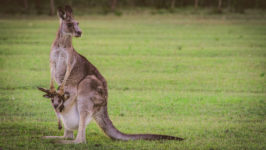Teen Charged with Cruelty to Kangaroos

A 19-year old man has been charged with animal cruelty after killing 19 Kangaroos in Tura Beach, on the New South Wales southern coast.
It is alleged the man went on a killing spree over the weekend, spotlighting the animals late at night and then running them over in his ute. Locals woke up to find the carcasses, which include tiny joeys, strewn all over footpaths in the semi-suburban area on Sunday morning.
Three of the surviving roos are recovering in veterinary care.
Police arrested and charged the man earlier this week, and he has been released on conditional bail to face court again at the end of November.
In New South Wales, the welfare of animals, including farm animals and pets, is governed by the Prevention of Cruelty to Animals Act 1979 (the Animal Cruelty Act) as well as section 530 of the Crimes Act 1900.
Cruelty to animals
Section 5 of the Animal Cruelty Act prescribes a maximum penalty of 6 months in prison and/or a $5,500 fine for any person who commits an act of cruelty to an animal, or while in charge of an animal fails to prevent it from going through pain.
An ‘act of cruelty’ includes any act or omission that unjustifiably, unnecessarily or unreasonably causes the animal to be:
- Beaten, killed, wounded, kicked, mutilated, maimed, pinioned, abused, tormented, tortured, terrified or infuriated
- Over-worked, over-loaded, over-driven, over-ridden or over-used; or
- Exposed to excessive cold or heat
- Inflicted with pain
An ‘animal’ is defined as any member of a vertebrate species, including fish, bird, mammal (other than human), reptile or amphibian.
Aggravated animal cruelty is an offence under section 6 of the Act which carries a maximum penalty of 2 years in prison and/or a fine of $22,000.
Aggravated cruelty includes:
(a) causing the death, deformity or serious disablement of the animal, and
(b) the animal being so severely injured, so diseased or in such a physical condition that it is cruel to keep it alive.
Section 530 of the Crimes Act prescribes a maximum penalty of 5 years in prison for “serious animal cruelty”, which includes torturing, beating or killing an animal.
These offences can be prosecuted by Police as in this case, or by animal welfare groups such as the RSPCA.
Types of penalties NSW
The type of penalties a court can impose on offenders who are guilty of animal cruelty offences range from full time imprisonment to a good behaviour bond.
According to the Judicial Commission of NSW, the actual penalties imposed for these types of offences are as follows:
- Prison: 40%
- Fine Only: 13%
- Section 9 Bond: 13%
- Community Service Order: 13%
- Intensive Corrections Order: 13%
- Suspended Sentence: 7%
The average prison sentence for the offence is a little more than 15 months imprisonment, and the average non-parole period (or minimum prison term that must be served) is 9 months in prison.
Kangaroos are protected, but ‘culling’ is permitted
Kangaroos are a native and protected species under Australian law and to kill, buy, sell or possess kangaroos is a criminal offence.
‘Culling’ is permitted under very specific guidelines and is a deeply divisive issue in Australia, with opponents saying there is no real evidence to that reducing kangaroo numbers helps the environment.







